
Transport in Norway is highly influenced by Norway's low population density, narrow shape and long coastline. Norway has old water transport traditions, but road, rail and air transport have increased in importance during the 20th century. Due to the low population density, public transport is somewhat less built out in rural areas of Norway, however public transport in, and around cities is well developed.
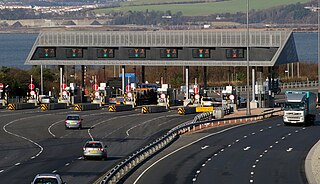
Road pricing are direct charges levied for the use of roads, including road tolls, distance or time-based fees, congestion charges and charges designed to discourage the use of certain classes of vehicle, fuel sources or more polluting vehicles. These charges may be used primarily for revenue generation, usually for road infrastructure financing, or as a transportation demand management tool to reduce peak hour travel and the associated traffic congestion or other social and environmental negative externalities associated with road travel such as air pollution, greenhouse gas emissions, visual intrusion, noise pollution and road traffic collisions.
Trondheim Toll Scheme or Trondheim Package was the result of that in the 1980s politicians and road authorities in Trondheim, Norway wanted to accelerate the investments in roads and motorways around the city through an investment package and toll scheme to ease construction and generate more funds. Between 1991 and 2005, there were more than 20 toll plazas throughout the city that help finance the new roads. Toll plazas will still remain east of the city at least until 2012. The toll collection is administrated by Trøndelag Veifinans.

Electronic toll collection (ETC) is a wireless system to automatically collect the usage fee or toll charged to vehicles using toll roads, HOV lanes, toll bridges, and toll tunnels. It is a faster alternative which is replacing toll booths, where vehicles must stop and the driver manually pays the toll with cash or a card. In most systems, vehicles using the system are equipped with an automated radio transponder device. When the vehicle passes a roadside toll reader device, a radio signal from the reader triggers the transponder, which transmits back an identifying number which registers the vehicle's use of the road, and an electronic payment system charges the user the toll.
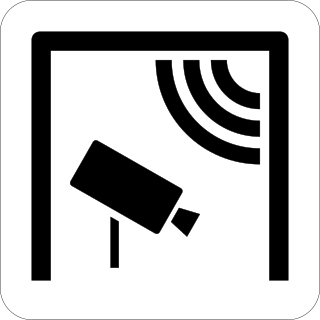
Autopass is an electronic toll collection system used in Norway. It allows collecting road tolls automatically from cars. It uses electronic radio transmitters and receivers operating at 5.8 GHz (MD5885) originally supplied by the Norwegian companies Q-Free and Fenrits. Since 2013 Kapsch and Norbit supplied the transponders. In 2016 the Norwegian Public Roads Administration revealed that they had chosen Norbit and Q-Free as suppliers of Autopass-transponders the next four years.
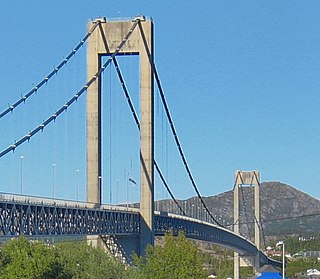
The Sotra Bridge is a suspension bridge which crosses Knarreviksundet between Knarrevik in Øygarden Municipality and Drotningsvik on the mainland of Bergen Municipality in Vestland county, Norway. It carries two road lanes and two narrow pedestrian paths of National Road 555, providing a fixed link for the archipelago of Sotra. The bridge is 1,236 metres (4,055 ft) long, has a main span of 468 metres (1,535 ft) and a clearance of 50 metres (160 ft). In 2007, on average 25,494 vehicles used it per day.
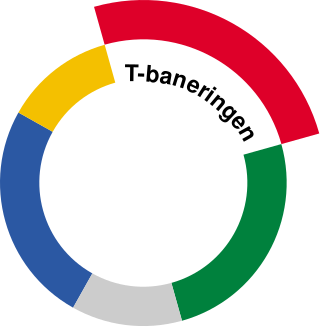
The Ring Line is the newest rapid transit loop line of the Oslo Metro of Oslo, Norway. It connects to the Sognsvann Line in the west and the Grorud Line in the east; along with these two lines and the Common Tunnel, the Ring Line creates a loop serving both the city centre and Nordre Aker borough. The 5.0 kilometres (3.1 mi)-long line has three stations: Nydalen, Storo and Sinsen. Four-fifths of the line runs within two tunnels, with the 1.0-kilometer (0.62 mi) section between Storo and Sinsen, including both stations, being the only at-grade part. The line connects to the Grorud Line north of Carl Berners plass and with the Sognsvann Line north of Ullevål stadion.

A toll road is a road over which users may travel over on payment of a toll, or fee. Tolls are a form of use tax that pays for the cost of road construction and maintenance, without raising taxes on non-users. Investor's bonds necessary for the construction of the roads are issued and sold with the expectation that the bonds will be paid back with user tolls. The toll roads may be run by government agencies that have bond issuing authority and/or private companies that sell bonds or have other sources of finance. Toll roads are usually a government guaranteed road monopoly that guarantees limited or no competing roads will be built by government agencies for the duration of the bonds. Private toll roads built with money raised from private investors in expectation of making money from the tolls probably dominated early toll roads. Government sponsored toll roads often guarantee a minimum payment to the bond holders if traffic volume and toll collections are less than predicted. If the toll authority is a private company there is often a maximum amount of fees that they may extract from users. Toll road operators are typically responsible for maintaining the roads. After the bonds are paid off the road typically reverts to the government agency that authorized the road and owns the land it was built on. Like most government taxes it is not unusual for tolls to continue to be charged after the bonds have been paid off.

Ruter AS is the public transport authority for Oslo and Akershus counties in Norway. Formally a limited company – 60% of its shares are owned by the Oslo county municipality and 40% by that of Akershus – it is responsible for the administration, funding, and marketing of public transport in the two counties, including buses, the Oslo Metro, Oslo Trams, and ferry services. Ruter also holds agreements with Entur concerning the regulation of fares on local and regional train services operated within the two counties.
Oslo Package 3 is a political agreement and plan for investments of 53 billion kr in Oslo and Akershus, Norway. It involves financing for road and public transport infrastructure, as well as operating subsidies to public transport in the period 2008–27. It will be part of the National Transport Plan 2010–19. In addition to state grant, the main financing will be through toll ring around Oslo. The plan is a follow-up on its predecessors, the Oslo Package 1 and Oslo Package 2.
The Oslo Package 2 or O2 is a political agreement for financing investments in public transport in Oslo and Akershus, Norway. The program ran from 2001 to 2011, and includes many large and small investments in railways, the Oslo Tramway, the Oslo Metro and infrastructure for buses. Total budget is 15.6 billion kr. The project is a cooperation between the transit authorities Oslo Sporveier and Stor-Oslo Lokaltrafikk, Oslo Municipality and Akershus County Municipality, and the government agencies of the Norwegian National Rail Administration and the Norwegian Public Roads Administration.
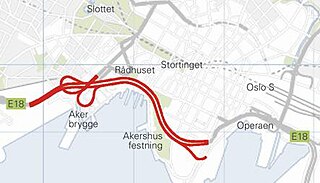
The Festning Tunnel is a motorway tunnel on European Route E18 in the city center of Oslo, Norway. The tunnel has two tubes, with three lanes in each. It runs from Bjørvika, under Akershus Fortress, The City Hall Square and Vika to Filipstad. The tunnel is 1,800 metres (5,900 ft) and −45 m (−148 ft) elevation at the deepest.

Oslo Package 1 was a political agreement and plan for introducing an urban toll ring around Oslo, Norway and making 31 investments to road infrastructure in Oslo and Akershus. The package was approved in 1988 and toll charges were introduced in 1990. It was supplemented by Oslo Package 2, which included a similar scheme for public transport. In 2008, they were both replaced by Oslo Package 3.
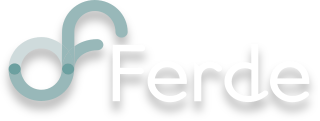
Ferde AS is a Norwegian toll company owned by Agder, Rogaland and Vestland counties. The company was created on 5 October 2016 is headquartered in Bergen. The company was called Sørvest Bomvegselskap AS until 1 January 2018. All toll roads in Norway have a toll road operator responsible for the financing of the road project. The right to demand payment of toll charges is granted when a toll charge agreement is entered into with the Norwegian Public Roads Administration.
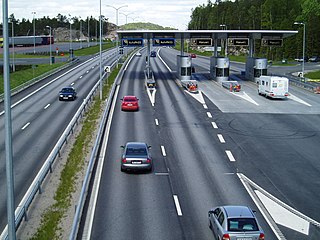
EasyGo is a joint venture between Norway, Sweden, Denmark and Austria, that enables use of a single electronic toll tag on toll roads, ferries and bridges in all the member countries. The purpose of EasyGo is to enable the use of one OBE for payment when driving through any toll facility one might encounter on the way through Northern Europe and Austria.

Road tolling to finance bridges, tunnels and roads has a long history in Norway. The cities Oslo, Bergen and Trondheim introduced toll rings between 1986 and 1991 as a means to discourage urban traffic and to finance infrastructure projects around those cities. Today toll rings circumscribe Oslo, Kristiansand, Stavanger, Haugesund, Bergen, Askøy, Bodø, Harstad, Grenland, Førde and Trondheim. Besides toll rings, road tolls are installed to finance certain road projects, and often also on the existing road to discourage people from using it. Some tolls use congestion pricing and/or environmentally differentiated toll rates.

Vegfinans AS is a Norwegian toll company owned by the counties Akershus, Buskerud, Innlandet, Telemark, Vestfold and Østfold. The company was created on 14 February 2001 and is headquartered in Drammen. All toll roads in Norway have a toll road operator responsible for the financing of the road project. The right to demand payment of toll charges is granted when a toll charge agreement is entered into with the Norwegian Public Roads Administration.
Vegamot AS is a Norwegian toll company owned by Trøndelag and Møre og Romsdal counties. The company was created in 1983 and is headquartered in Trondheim. All toll roads in Norway have a toll road operator responsible for the financing of the road project. The right to demand payment of toll charges is granted when a toll charge agreement is entered into with the Norwegian Public Roads Administration.

Bompengeselskap Nord AS is a Norwegian toll company owned by Nordland, Troms and Finnmark counties. The company was created 17 August 2016 and is headquartered in Narvik. All toll roads in Norway have a toll road operator responsible for the financing of the road project. The right to demand payment of toll charges is granted when a toll charge agreement is entered into with the Norwegian Public Roads Administration.














